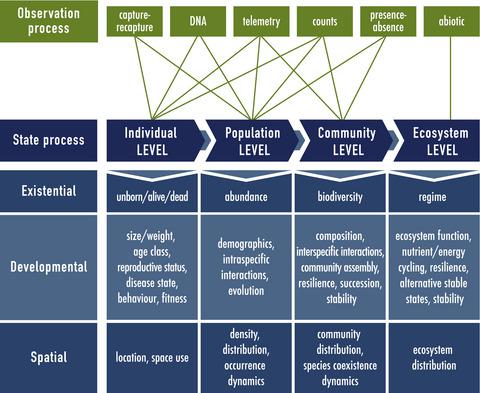当前位置:
X-MOL 学术
›
Ecol. Lett.
›
论文详情
Our official English website, www.x-mol.net, welcomes your feedback! (Note: you will need to create a separate account there.)
Uncovering ecological state dynamics with hidden Markov models
Ecology Letters ( IF 8.8 ) Pub Date : 2020-10-19 , DOI: 10.1111/ele.13610 Brett T. McClintock 1 , Roland Langrock 2 , Olivier Gimenez 3 , Emmanuelle Cam 4 , David L. Borchers 5 , Richard Glennie 5 , Toby A. Patterson 6
Ecology Letters ( IF 8.8 ) Pub Date : 2020-10-19 , DOI: 10.1111/ele.13610 Brett T. McClintock 1 , Roland Langrock 2 , Olivier Gimenez 3 , Emmanuelle Cam 4 , David L. Borchers 5 , Richard Glennie 5 , Toby A. Patterson 6
Affiliation

|
Ecological systems can often be characterised by changes among a finite set of underlying states pertaining to individuals, populations, communities or entire ecosystems through time. Owing to the inherent difficulty of empirical field studies, ecological state dynamics operating at any level of this hierarchy can often be unobservable or ‘hidden’. Ecologists must therefore often contend with incomplete or indirect observations that are somehow related to these underlying processes. By formally disentangling state and observation processes based on simple yet powerful mathematical properties that can be used to describe many ecological phenomena, hidden Markov models (HMMs) can facilitate inferences about complex system state dynamics that might otherwise be intractable. However, HMMs have only recently begun to gain traction within the broader ecological community. We provide a gentle introduction to HMMs, establish some common terminology, review the immense scope of HMMs for applied ecological research and provide a tutorial on implementation and interpretation. By illustrating how practitioners can use a simple conceptual template to customise HMMs for their specific systems of interest, revealing methodological links between existing applications, and highlighting some practical considerations and limitations of these approaches, our goal is to help establish HMMs as a fundamental inferential tool for ecologists.
中文翻译:

用隐马尔可夫模型发现生态状态动力学
生态系统的特征通常是随着时间的推移,与个人,人口,社区或整个生态系统有关的有限状态之间的变化。由于实地实地研究的固有困难,在这种层次结构的任何级别上运行的生态状态动态通常是不可观察的或“隐藏的”。因此,生态学家必须经常与某种程度上与这些潜在过程相关的不完整或间接观察结果抗衡。通过基于可用于描述许多生态现象的简单而强大的数学特性来正式区分状态和观察过程,隐马尔可夫模型(HMM)可以促进对复杂的系统状态动力学的推断,而这些动力学本来是很难解决的。然而,HMM仅在最近才开始在更广泛的生态社区中获得关注。我们对HMM进行了详尽的介绍,建立了一些通用术语,回顾了HMM在应用生态学研究中的广阔领域,并提供了有关实现和解释的教程。通过说明从业人员如何使用简单的概念模板为他们感兴趣的特定系统自定义HMM,揭示现有应用程序之间的方法学联系以及强调这些方法的一些实际考虑和局限性,我们的目标是帮助建立HMM作为基本的推理工具对于生态学家。回顾HMM的广泛应用生态研究范围,并提供有关实施和解释的教程。通过说明从业人员如何使用简单的概念模板为他们感兴趣的特定系统自定义HMM,揭示现有应用程序之间的方法学联系以及强调这些方法的一些实际考虑和局限性,我们的目标是帮助建立HMM作为基本的推理工具对于生态学家。回顾HMM的广泛应用生态研究范围,并提供有关实施和解释的教程。通过说明从业人员如何使用简单的概念模板为他们感兴趣的特定系统自定义HMM,揭示现有应用程序之间的方法学联系以及强调这些方法的一些实际考虑和局限性,我们的目标是帮助建立HMM作为基本的推理工具对于生态学家。
更新日期:2020-11-12
中文翻译:

用隐马尔可夫模型发现生态状态动力学
生态系统的特征通常是随着时间的推移,与个人,人口,社区或整个生态系统有关的有限状态之间的变化。由于实地实地研究的固有困难,在这种层次结构的任何级别上运行的生态状态动态通常是不可观察的或“隐藏的”。因此,生态学家必须经常与某种程度上与这些潜在过程相关的不完整或间接观察结果抗衡。通过基于可用于描述许多生态现象的简单而强大的数学特性来正式区分状态和观察过程,隐马尔可夫模型(HMM)可以促进对复杂的系统状态动力学的推断,而这些动力学本来是很难解决的。然而,HMM仅在最近才开始在更广泛的生态社区中获得关注。我们对HMM进行了详尽的介绍,建立了一些通用术语,回顾了HMM在应用生态学研究中的广阔领域,并提供了有关实现和解释的教程。通过说明从业人员如何使用简单的概念模板为他们感兴趣的特定系统自定义HMM,揭示现有应用程序之间的方法学联系以及强调这些方法的一些实际考虑和局限性,我们的目标是帮助建立HMM作为基本的推理工具对于生态学家。回顾HMM的广泛应用生态研究范围,并提供有关实施和解释的教程。通过说明从业人员如何使用简单的概念模板为他们感兴趣的特定系统自定义HMM,揭示现有应用程序之间的方法学联系以及强调这些方法的一些实际考虑和局限性,我们的目标是帮助建立HMM作为基本的推理工具对于生态学家。回顾HMM的广泛应用生态研究范围,并提供有关实施和解释的教程。通过说明从业人员如何使用简单的概念模板为他们感兴趣的特定系统自定义HMM,揭示现有应用程序之间的方法学联系以及强调这些方法的一些实际考虑和局限性,我们的目标是帮助建立HMM作为基本的推理工具对于生态学家。



























 京公网安备 11010802027423号
京公网安备 11010802027423号